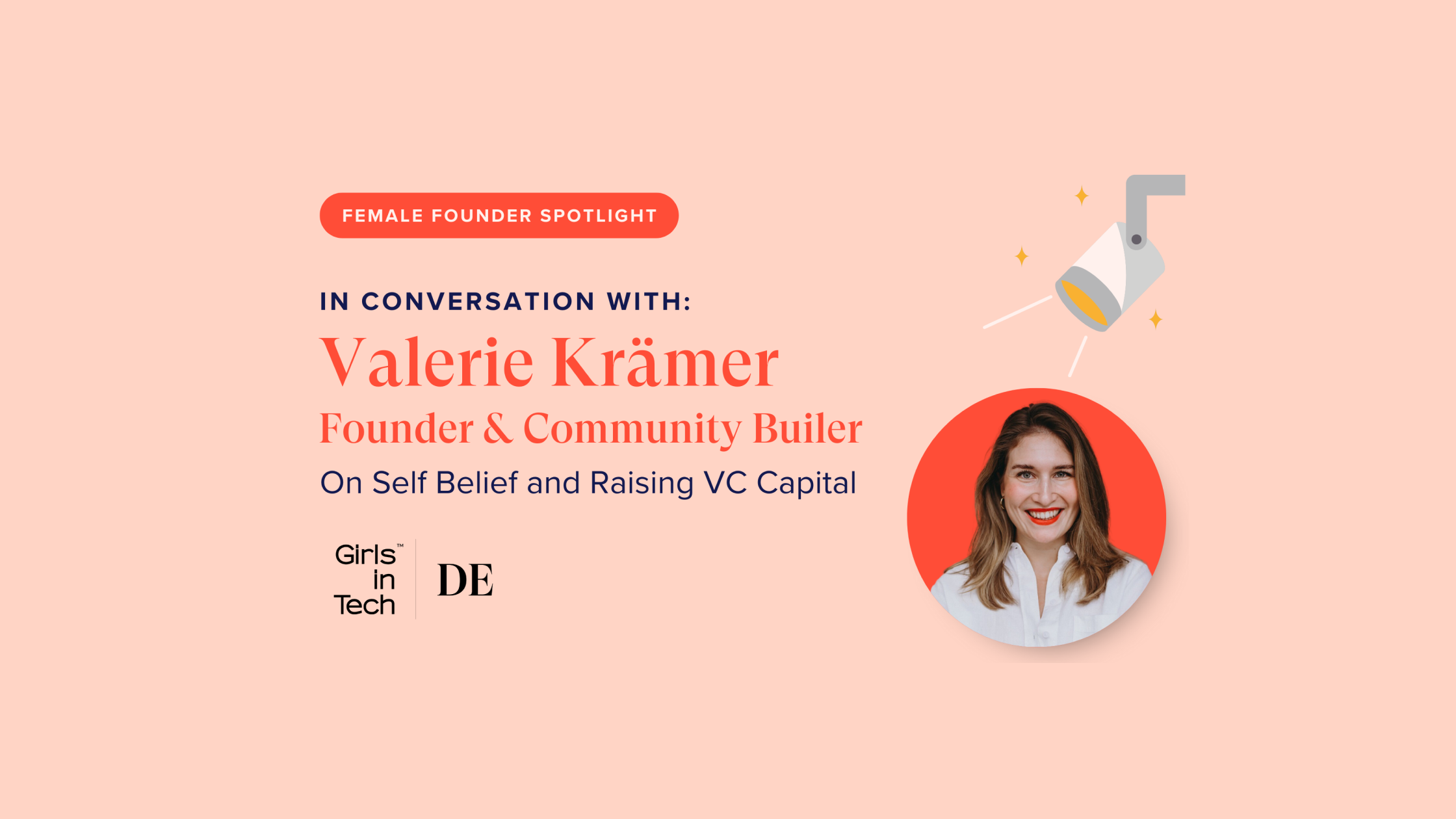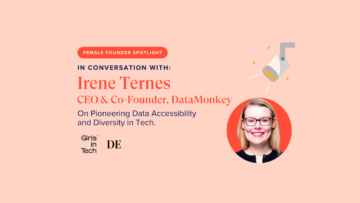This interview is part of our Female Founder Spotlight Series. We sat down with Valerie Krämer, former CEO & Co-Founder of Remi which she led to be acquired, to talk about her journey.
Hey Valerie! Thanks for taking part in Girls in Tech Germany’s Female Founder Spotlight Series! Please can you introduce yourself?”
Hi, I’m Valerie! I’m a Founder and Community Builder. I most recently was part of the founding team at Bento, which is a personal page builder to share everything everything you are and create. It’s a link bio, like Linktree. It was acquired by Linktree because they identified the potential in our product, as well as the team.
Most recently before that I founded a company called Remi, which was a culture building platform for remote and distributed teams. And before that I was part of the early team at Twitter in the DACH market, building up the market and emerging markets, as well as at Opinary, which is also an early stage mediatech startup where I’ve been building and spearheading marketing and sales and building up the team. And here I am at Linktree right now!
“Amazing! So what firstly led you into the tech industry in the first place, and then later led you to founding Remi? What did that journey look like for you?”
I actually started my career at the German Press Agency, so I was really in the media content business more than tech. There was also a software they were selling, but I wouldn’t say it was really ‘tech’ at that time at least.
And I have no idea why, but back then I always wanted to work at Google, Facebook or Twitter. That was my dream. I wanted to change the world for the better through technology. This is the reason why I heavily focused on applying to those companies. And I got a lot of rejections! I was also going through a lot of interviews where I got very far in the process and then still didn’t make it.
I then got an offer from Twitter and this is basically how I would say I started my career in tech. I was just amazed by the potential and the opportunities and the fast pace, the international vibe, the different cultures, all of it. The mix was just exciting to me.
“Very cool. And at what point did you decide to co-found your first business, Remi?”
When I was at Twitter, I already started mixing and mingling with founders. That was still when I was in Hamburg, but I was already interested because I was building new markets from scratch. Which I would say is pretty similar to founding a company… Obviously there are a lot of differences in responsibility, and the sleepless nights etc that I noticed later on! But this was the first starting point where I noticed I just love building things from scratch, or I love building things up. And basically when I then moved to the next company, which was Opinary, so my first startup experience, I noticed maybe actually founding something myself could be interesting.
I never even considered myself a founder. I never thought that I would personally be a founder. I don’t know, I didn’t think of myself this way. But when I was in the startup, I basically was employee number 15. I was building up the whole team, the whole sales and marketing team and everything. And for me personally, I was so inspired by the founders and their journey and how they were thinking and going about things. But I think after like one or two years, I was like, maybe I want to do this myself. So then I actually started talking to them about it and said, “can you teach me this? I would like to learn this. Can you talk to me about this topic and how did you go about this?”.
Being part of a startup already helps you gain a lot of experience – how you do things and how you maybe don’t do things. It’s the first learning experience and I think it’s actually the best way to get into founding yourself. At some point after three years, I was part of the executive team. I was actually the only one in the executive team not being a founder… I was thinking, maybe I want to do this myself.
So actually, on the peak of the pandemic, I quit my job without knowing what’s actually going to happen. I didn’t work on something while working at Opinary. I didn’t know what’s going to happen next. I basically just quit into the unknown. And this is when the idea of Remi then came to me, founding a remote culture building platform.
“Wow, so you really jumped in the deep end! Do you think that’s the best way to do it?”
I don’t know if it’s the best way for everyone. It depends on your personal life, it depends on your circumstances. Right? If you have a family, it depends on your financial setup. It depends on all these kinds of things. So I don’t think it’s always the best situation for everyone. But for me personally, also being in Germany, which is obviously a very privileged location to be where there is some kind of cushion that supports people. You have at least some time to think and breathe. And that’s the beauty of it. In Germany, there’s also something called Gründungszuschuss, which is nice. So the government supports you in starting your business. So, for instance, if you start a freelance business, they’re giving you a bit more money on top of the employee benefits for roughly six months. So you can kind of get going, and then hopefully after six months, you’re in a position or situation where you can finance this yourself, or in my case, for instance, then raising money from investors.
But basically, for me personally, it was the right decision because I was so loyal to my previous employer. I always gave 180%. There was not enough headspace that I could have come up with something else, and I always jump right in. So this was, for me personally, the perfect way to go about it.
“And what were some of the challenges you faced, particularly as a female founder of a tech startup at the time you were starting out?”
It’s interesting because my co-founder and myself, we both were non-technical, and we wanted to build a tech product. We didn’t want to go down the agency route, we didn’t want to be consultants, we wanted to build SaaS. When we identified the problem that throughout the pandemic, everyone had to work from home and kind of noticed that it’s really hard to build connections from home with their colleagues, we thought – we want to help, we want to build a solution for this.
The big challenge was really that we weren’t technical, that we didn’t know how to actually build something like this, so we had to teach it to ourselves. My co-founder was responsible for all things product, and what was nice at that time, there was a trend in the no code field. There were actually a lot of products where non technical people like us were able to build products quite easily. Now, with ChatGPT, this is even more accessible, but at that time, it was hard. And so we were teaching ourselves no code tools, especially Rebecca. We then became part of the no code programme from Ondeck. That was quite big at the time and we were part of the first cohort, and we actually started building this ourselves then because we couldn’t convince anyone to join us at that time because we actually couldn’t visualise yet how it’s going to look like.
Sometimes you have an idea, but it’s very intangible for everyone else. So what you need is to actually get going and design something or scribble or draw something, to be able to make it tangible for other people. And this was basically the first challenge we had to overcome. I think the second challenge is generally being two women in tech, then building a product that no one trusts you to be able to build. And then being in a male dominated, or getting into this very male dominated VC environment, I would say, wanting to raise money was definitely a big challenge of ours.
“I’d love to hear a bit more about the VC challenge side. Maybe any particular experiences or how you navigated that environment as a female founder?”
Overall, I think what we experienced is the feeling that people just trust men more to get something done and to be successful. And also to give them the benefit of the doubt, that even if they don’t have experience in something, they will still be able to do it. And women always have to explain themselves a lot more. They have to answer very different questions.
I noticed this personally – we always had the feeling we needed to prepare ourselves a lot more. Like, we have to be double / triple prepared for the questions. We need to show people that we’re not perfect, but that we know what we’re doing. And I think this was a lot of stress on us, that we also put on ourselves. A lot of very high expectations, that we had the feeling we need to always go the extra mile to prove ourselves.
Because honestly, 2020/2021, when we raised, this was actually where everyone now talks about the time where money was just being thrown around. I think raising money is always hard for anyone, no matter your gender or background. Generally, it’s always hard. Usually you’re starting with a funnel of say 50 VCs, and then in the end maybe 1 says yes. So it’s always a mental challenge. But overall, I feel like there was a lot of prejudice and unconscious bias in the process. This was also the reason why we looked for a lot of female business angels. We always wanted that. Our goal was to have a very diverse cap table, so we really were looking for 50% – which we also achieved and I’m very proud of.
“That’s really interesting. I see the stats that show only 2% of VC funding goes to all female founding teams, and then if literally one of the co-founders is male, it goes up to like 16%.”
It’s crazy. Many times men can also just sell themselves better. It is sadly the truth. They are just very convinced of themselves and their ideas. I mean, this is very cliche now what I’m saying, so please take it with a pinch of salt. But I think overall that is the case.
There’s no reason why women shouldn’t be as confident and also be out there overselling themselves every once in a while.
“How have you seen the tech landscape change, in terms of diversity, during your career?”
I have the feeling overall there’s more awareness for diversity and there’s more urgency as well. But generally, I think it’s funny because I always have these conversations with certain people in the startup world, they always say they are so modern and so innovative, you know, and in the end, that’s not the truth. Startups can be just as conservative as a big corporation can be, because in the end, it’s all about the person that’s actually leading the company. And if they believe diversity is important, or if they believe that this is something to invest in, then the rest of the company will also be more diverse and more open minded. So it all comes down to the people who start things and then shape the culture of this company.
I believe that’s the reason why there’s only 2% of women being funded, but then also, I think roughly only 20% of founders are actually women. So that’s obviously also a problem. If there are not enough role models, then people will also not be able to see that there is an option, right? If they don’t have the role models in their circle of friends and family and maybe second level connections. It’s really hard for people to get the confidence to be able to do things.
For me, I have a Mother who has always been working, and who is a personal role model to me. So I’m very privileged in that way, that I’ve seen her always be out there, but not everyone has this. And then that’s why you need initiatives like Girls in Tech to actually be able to see those figures. So I think overall, there is awareness, but there’s still a lot to do.
“Well, this leads me perfectly on to my final question, which is around advice for women and also people from other underrepresented communities who are pursuing, starting their own business, or pursuing a career in a tech startup.
Do you have any advice or learnings from your journey that you’d like to share?”
I think personally what’s always been very important to me, from early on in my career, I’ve been paying a lot of focus on relationships and building my network. And this is what it all comes down to in the end.
The beauty is, in the early days, you think, “oh shit, I don’t know anyone!” But the more jobs you have, you always take people with you. And even if they’re not with you in the company, ideally you always see people twice in life.
So this is how I think about relationship building within and outside of companies. I think one very important part is to think about who you want to be spending your time with, who inspires you, who are the people that you want to connect with, that you want to learn from.
It’s not that I reached out to someone and said, can you please be my mentor? Usually I was looking for leaders in companies, so I looked for a company because I liked the product or whatsoever. But then I think the most important thing is to choose your leader wisely. So really thinking about, is this a person that challenges me, that supports me, that empowers me? And this has always been something where I guess I was lucky most of the time at least, that there were people who supported me and who empowered me and inspired me also to become and fulfil my full potential.
I’m very thankful for these people, but then I kind of personally also looked out for them too. I basically used them as my mentor versus really actively, officially having to say or call it this way. I just asked them a lot of questions. And I think this is the third thing that I would say after networking and looking for the people who might be your mentors or that you want to learn from, is truly just asking people for help. I know it’s always hard and difficult to put yourself out there, but I honestly have done that all my life and it worked brilliantly, is to really identify the issue that you currently have, or identify the goal of where you want to be at. And then you’re thinking – who do I need to approach now? Who can help me get there or who is already there that I can learn from?
I still remember when I was younger, this might be a really weird thing to say, but I literally looked at careers of people. Like, this is a person that I think is inspiring. This is where I want to be someday. And I then checked out, what did they do? What did they write about? What were the different jobs that they did before? This was something that I was always doing. I was doing my research and then thinking how can I connect with these people? How can I learn from them? Where can I meet them? I think it always starts with a goal, that’s definitely important, and then thinking about how you get there and asking for help and approaching people proactively. I think this is always easier said than done, but I think if you overcome that fear, it’s very beneficial!
“That’s super helpful, thank you Valerie! Anything else you want to finish on or share with the Girls in Tech community?”
I’ll leave you with my personal motto, which is: ‘she believed she could, so she did’.
I think this is all where it all starts. It is a strong belief in yourself and then just simply trying and doing the things, because usually no one else knows. And you will not learn if you don’t take the risk many times. The worst thing that can happen is that you learn. And this is how I approach life – defining my decisions based on opportunities, not on fear.
“What a perfect, inspiring way to finish. Thank you Valerie!”
Thank you!






